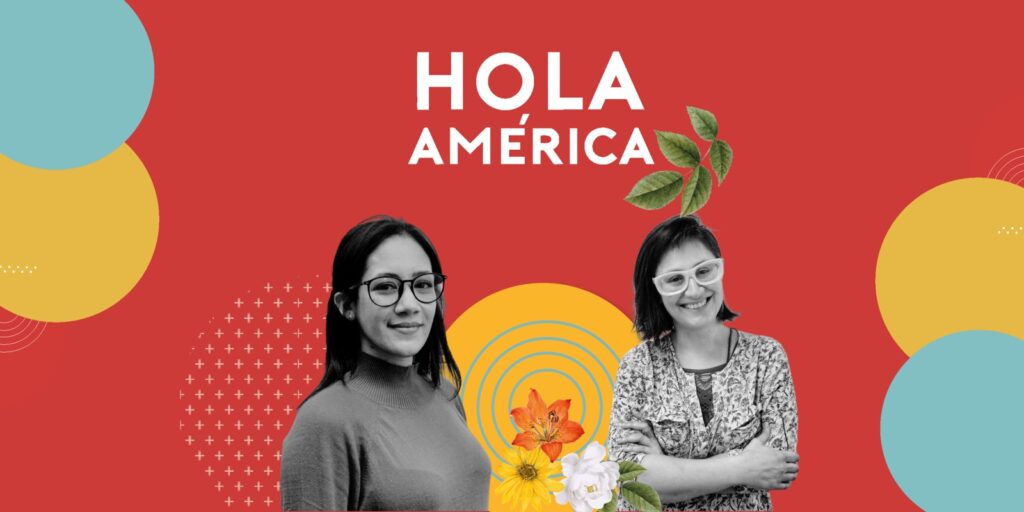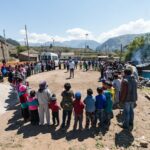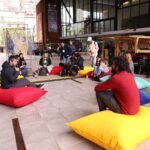- April 4, 2023
- Natalia Araya y Benjamín Pino

From migrant to migrant: Lorena Tasca and Marianny Pacheco
In the first edition of the cross-interviews ‘From migrant to migrant’, we invited Lorena and Marianny, Venezuelans living in Santiago and Buenos Aires respectively, to reflect on the circumstances of their departure from their country of origin and the challenges of integration in their new communities, to which they contribute every day through social innovation.
The first‘Migrant to Migrant’ conversation took place in March between Lorena Tasca, Director of Communications and Marketing at 2811, and Marianny Pacheco, Hello World’s coordinator for Ashoka in Latin America. Both are Venezuelan, but Lorena migrated to Chile and Marianny to Argentina. From their new countries, both reflected on the joys and challenges they have experienced as migrant women.
What was your first impression when you arrived in your new country?
Marianny:
When I read that question it brought me back. I have been living in Argentina for six years, in Buenos Aires, and the truth is that it was nice. I migrated alone, by choice, a week after my birthdayeven though the situation in Venezuela was very difficult.
But I arrived happy, it was an impression of positivism, thinking “I made this decision, let’s go ahead and that this beautiful city will accompany me”. If I had to sum it up, it was a breath of fresh air after everything that was going on over there, despite leaving the family.
Lorena:
Every March 8, I am with Chile on my anniversary. I arrived nine years ago and my first impression was strange because I had already been in Santiago for Lollapalooza. I used to be a music journalist, I was very aware of that. But in tourist mode it is very different.
When I arrived there were many uncertain plans. I came, in principle, because I won a scholarship to study for a master’s degree, and I was not sure if I was going to stay or not.
One of the things I had planned to do was to study a master’s degree outside the country and it coincided with the fact that Those last years in Venezuela were dreadful, the crisis at its peak, shortages, working in a newspaper that was suffering a number of dreadful threats, in less than a year I had more than four guns to my head.
I think every March 8 I remember why it cost me. Also, it was arriving in a country where the feminist movement has been very powerful for years: to see the street mobilized and the city in a different way was very strange, but because I was already in a very particular situation.
Do you feel welcomed by your host city?
Marianny:
The answer is undoubtedly yes. I am a great supporter of Buenos Aires, I live in Capital Federal, mega center of the city, and since I arrived I have felt very welcome by the community that I have managed to form. I think it is not minor, considering where we come from and how difficult the last ten years were, where the strong migratory wave of Venezuelans began to emerge.
It is a very beautiful city, quite orderly, colorful, very diverse in every sense of the word. That made me feel very much a part of it and it has been that way all these years. I have felt that I can create, contribute, recognize and acknowledge myself from that place.
In Venezuela I worked in public administration, and when I left it was a bit of a product of that: I worked in a government in opposition to the Venezuelan government, so I was super challenged. Here I have worked only in social organizations that seek a positive social impact on vulnerable communities.
When I arrived, I worked in an organization where we had to visit vulnerable neighborhoods in the city of Buenos Aires. Now, with what we do at Hola América, I connect much more with communities of migrants and refugees, Venezuelans and other nationalities. That makes me feel part of Buenos Aires but also closer to our country, and that connection is very nice.
Lorena:
I don’t know if you have seen a meme of Venezuelans in Argentina versus Venezuelans in Chile, have you seen it, I’ll pass it on to you later. If you had asked me five years ago I would have said ‘absolute and unconditional love’, but the last few years have been very strange.
Santiago in particular has changed a lot, I don’t know if I would dare to say that the santiaguino has changed too. I have felt very privileged because I have taken this option, arriving in Chile has been an absolute transformation for me, that’s why for the last seven years I have dedicated myself to work in social enterprises, foundations and organizations. That circle is very different from other environments.
Then I have seen and have friends who have had a bad time because of xenophobia. I have seen more and more comments from people I don’t even know, very misguided and xenophobic. That has made me uncomfortable in recent times.
But beyond that, I have been a great defender of Santiago. The Santiago people themselves hate Santiago and I think it’s wonderful: it has wonderful public transportation, the mountain range after the rain I think it’s a spectacle. It is a city with a lot of cultural activities. Every day there is something to do, it is a very lively city.
I like living here, what I have achieved and what I have become, but something has happened lately, this migrant condition has made me get very down.
What would you improve about the immigration process in your new country?
Marianny:
I stayed with the last thing you said, it really catches my attention. I have quite a few friends in Chile who have clicked the last few years. Migratory flows have also varied over the years. The last three years and the pandemic brought an additional challenge to migration processes, especially for the Venezuelan population.
The biggest challenge of the migration process, which even determines the decision to migrate or not, is how you can regularize, how easy it is to be legally in the country where you migrate and if that makes you access -or not- to rights.
Argentina is well positioned to provide rights to migrants and refugees. There is an integrated system that offers, in a relatively short time compared to other countries in the region, to be regularized quickly. But it differs according to the country of origin and a type of discrimination arises.
Mercosur countries have regularization facilities that other countries do not have. Here, first you have a temporary residency of two years, and with that residency it is difficult to access some things, such as banking, there are jobs to which you cannot apply without a DNI or definitive VISA, until you have the formal document.
Many times these processes take a long time. Now it’s faster because there are no longer as many people migrating here as when I arrived in 2018, one of the strongest years. I would improve that: the processes of regularization and greater accompaniment to people who migrate, on the part of the public agencies in charge.
Lorena:
I think it is more or less similar in Chile. The system collapsed: the website, the phone they had to call and get answers about the process is a headache. Now there is a world of immigration lawyers that if you pay them, they help you. And that is part of the new 2019 migration law.
If you want to speed up your process, you can opt for a lawyer, but that ends up complicating things because it forces you to pay someone who already knows the system to demand answers. It has become a strange world where you have to pay or do something to get an answer, because the system collapsed. It used to be a very simple process.
I believe that Chile is going through a learning process. As a very good Chilean friend tells me, Chile never in its life imagined that it would be a host country for migrants and refugees. She is an older friend, she is more than 50 years old and she tells me: ‘I have always seen Chile as a far away country, very isolated, I never thought that people would come to migrate, it is crazy’.
The most common thing was that Chileans were leaving because there were many things that were missing in Chile, that is why when I arrived nine years ago the process was very simple, there were two or three papers and there was a discrimination issue because if you arrived as a European they did not ask for anything. Among Latin Americans, before, only Colombians, Dominicans, Bolivians and Peruvians were asked for a criminal record, but I was never asked for a criminal record.
But of course, after these important migratory movements, they realized that they have to regulate, ask everyone the same, make a more robust process. That’s when the system collapsed.
There has always been migratory movement in Chile: Argentines who come when things are difficult in Argentina, Peruvians and Bolivians, that has always existed, they were just not prepared for so much.
Marianny: The differences between countries so close to each other are still striking. Here there is a tradition of historical migration, very traditional. You left me thinking about Latin America which is so diverse and has so many twists and turns.
Lorena: Yes, totally. And with the migration law they made in 2019 the issue is that they managed to adjust and improve, but the system collapsed. I have friends who have been waiting for two years for an answer to qualify for a definitive VISA.
Do you consider that migrating as a woman is a different experience from that of men?
Marianny:
Yes, without a doubt. Any woman you ask would say yes. It is a different experience because of everything we have historically been discriminated against and by the patriarchal system that on the one hand benefits phenotypes: men with more strength who can access certain types of jobs that we can accessand I think that touches all of us in some way.
Being in the social sector I don’t think I’ve seen it as much, but I have with close female friends, especially in terms of work: more benefits or possibilities of promotion to management roles linked in a veiled, unspoken way. There is more confidence in men beyond not having academic training or experience compared to women. I think the job placement experience is more challenging for us.
Lorena:
Definitely. Not to repeat, there is something about social that has always caught my attention. One is constantly asked if you migrated alone and how is it possible that you migrated alone. A My male migrant friends don’t ask them the same questions. There is always an interest in knowing if you have family with a Chilean or migrant, a curiosity about how one migrated.
I also see what you were saying about phenotyping, there are questions around that that I think, ‘why don’t my male friends get asked those questions?’ Of the style : are you really Venezuelan? You don’t look like one because Venezuelan women are like this and like that’. I do not understand. In those social things, Nany, sometimes I get too desperate.
Marianny: You got me thinking about how you intercept additional challenges to being a migrant, like migrating as a woman, being a migrant woman of color, being a migrant woman of color with a disability, there are a lot of layers that are super strong to analyze and one lives them.
More so for us Venezuelans who are so different in the way we look and speak. There’s a lot of prejudice associated, I think it’s a Latin American trend to ask ‘how do you look, how do you dress, do you dress up or not?’ It’s a big issue.
Do you think that migrating has given you tools? Would you migrate again?
Marianny:
Without a doubt, migrating has changed me as a person for the better. It has given me tools to be more resilient, more aware of my potential, of who I am, what I can contribute and what other people contribute to me. I recognize more my identity as a Venezuelan having migrated, simple things that I used to naturalize, such as coffee in the morning, the repita or always having the flag somewhere.
It puts you in a super strong identity place positively, but it also helps you to recognize the other much more. It is super powerful for anyone, it makes you be disciplined, determine tools, have short, medium and long term goals, more clarity on what you want and what you don’t want. To know yourself and those around you better.
For me it has been an impressive experience, very positive, but I think it varies whether you did it by choice or obligation, with respect to those who contain you and welcome you in the place where you arrive.
I am one of those who say that in the future I will return to Venezuela, which in my case would be to return .I would be very interested in contributing to the reconstruction of a country that is very broken. I would also migrate to another country. It gives many tools to nurture you from the other communities where you are.
Lorena:
I feel that I am another Lorena, compared to that Lorena who came to this country when she was 26 years old. I am impressed to realize how much I have changed, how many tools I have, I have learned a lot and also from another culture.
One of the things that has excited me the most in this process is to understand and connect more with my family history because I come from a family of migrants, an Italian woman and a Lebanese man who met in Venezuela.
Some nonos -grandparents- with a very hard history, who arrived with what they had during the Second World War, a father with great fears because he had to flee his country in one of the many terrible civil wars in Lebanon, for religious reasons. My sister has been moving around the world, now living in Taiwan.
Each of my dad’s brothers is in a different part of the world: I have family in Australia, Chicago, everywhere. And I think for me, one of the most powerful things about this process has been to connect so much more with that story.
I think I would migrate again. What happens to me now, I don’t know if it’s the age, but I would check very well how to do it. No way do I get to a master’s degree without knowing what to do, or whether to stay or not. When I arrived I had $500, to see what would happen.
I would migrate again if it is a good opportunity for growth, learning and planning. The first two years were too hectic and crazy, I lived many times on the edge of the abyss, so I am between a yes and a no.


